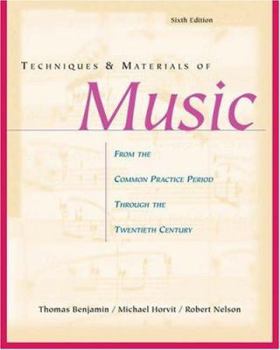Techniques and Materials of Music: From the Common Practice Period Through the Twentieth Century
Select Format
Select Condition 
Book Overview
Designed to serve as a primary text for the first two years of college music theory, TECHNIQUES AND MATERIALS OF MUSIC covers all the basics of composition-including harmony, melody, and musical form.... This description may be from another edition of this product.
Format:Hardcover
Language:English
ISBN:0534517595
ISBN13:9780534517595
Release Date:July 2002
Publisher:Schirmer
Length:312 Pages
Weight:1.80 lbs.
Dimensions:0.7" x 8.3" x 10.3"
Customer Reviews
3 ratings
Techniques and Materials of Music
Published by Thriftbooks.com User , 14 years ago
This book is so wonderful. I love how it so simply explains music theory, so that I can understand it better and become better!! I love it!!
Finally a clear theory book
Published by Thriftbooks.com User , 18 years ago
This is a perfect textbook for college students in their first two years. Part of the beauty of the book is that instructors have a great deal of flexibility in how to organize their beginning music theory classes. One can add more composition projects or less depending on the class. In my opinion, which differs from the first reviewer, music theory is intrinsically not a subject for people to study independently. Music is too complicated with too many chances for misunderstanding. Most people know that they need an instructor to study piano. Why would theory be different? The examples provided in the book are clear, very clear, and can easily be expanded with more complex musical examples and assignments. This textbook adds other musical textures apart from the often mistaught four part chorale textures with the parallel fifth and octave rules. No one in Bach's day (Bach is the model for this afterall) ever wrote chorales as vertical chord structures despite Walter Piston's strange misportrayal of this texture. Four part chorales are countrapuntal and that's how they're written. We now have generations of music students teaching who continue this myth to the detriment of their students who pass the nonsense along when they start teaching. Benjamin, Horvit, and Nelson along with Leo Kraft and his excellent books have helped correct this. This textbook is understandable, putting it far ahead of most of the others. I read Ottman and Piston and they are certainly pedantic and confusing. Both wax on with such lofty nonsense in their efforts to explain some of the most simple things. Why not just be clear? The students finally have a chance to understand the real stuff with Benjamin, Horvit, and Nelson. I urge you to get a desk copy and decide for yourself.
Best Basic Music theory Text
Published by Thriftbooks.com User , 21 years ago
After years of buying and perusing basic music theory texts, I was discouraged with the main ones for their denseness and tedious nature, such as Piston and Hindemith. For the amatuer wanting a well-designed guide to develop an understanding of how classical music works, this is by far the best. The steps are clear and logical, the exercises just what the learner needs, and the accompanying book of music examples a highly advisable purchase. You could do this on your own without a guide, given the fact that the materials have been tested in the classroom. The bibliography is also useful, if for nothing else than to show you why this vademecum is the most user-friendly and helpful.





